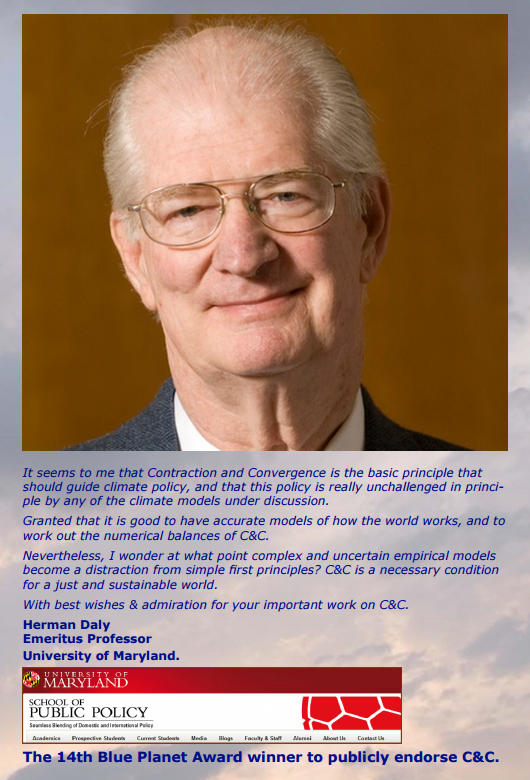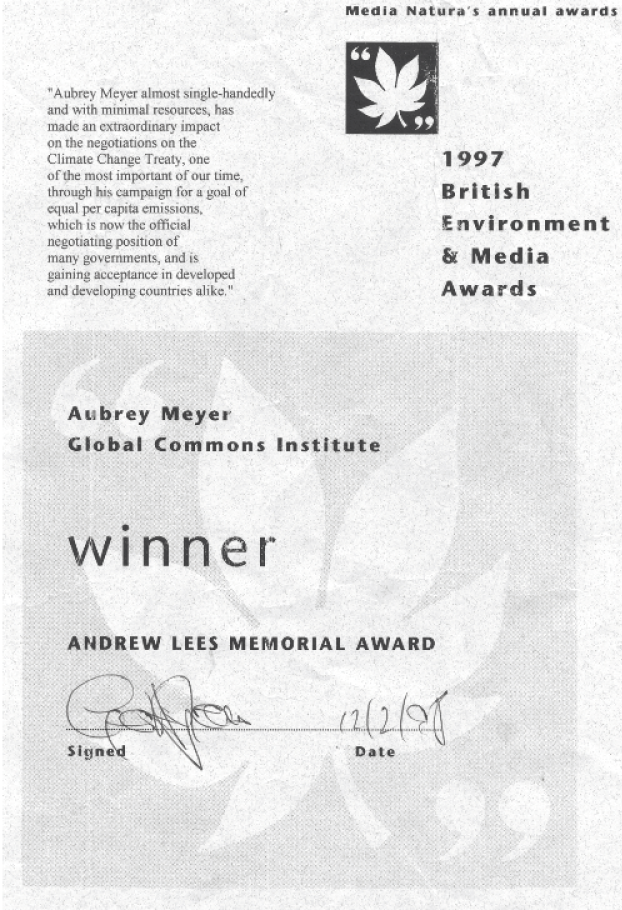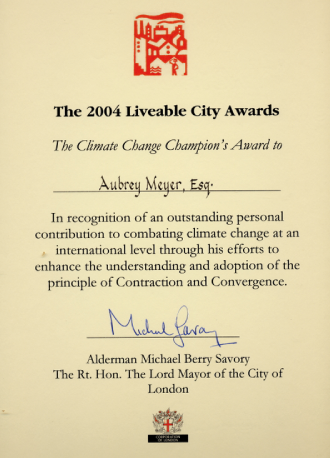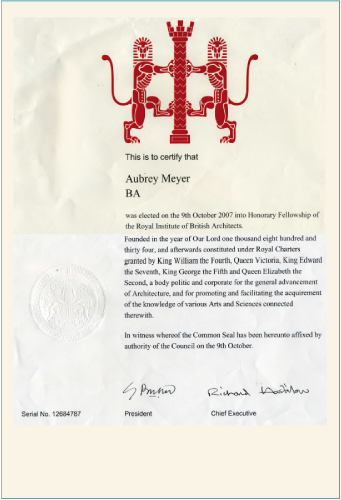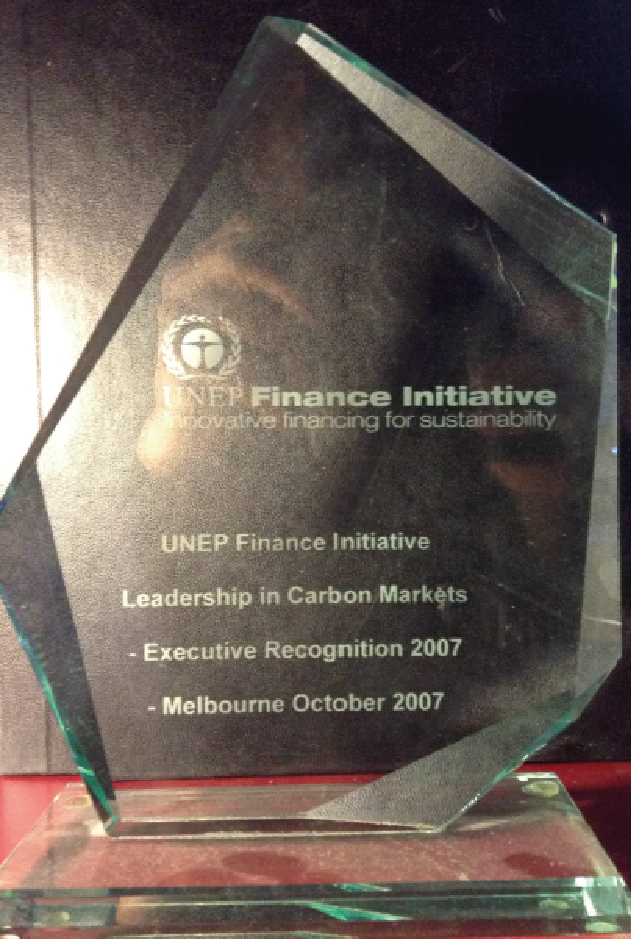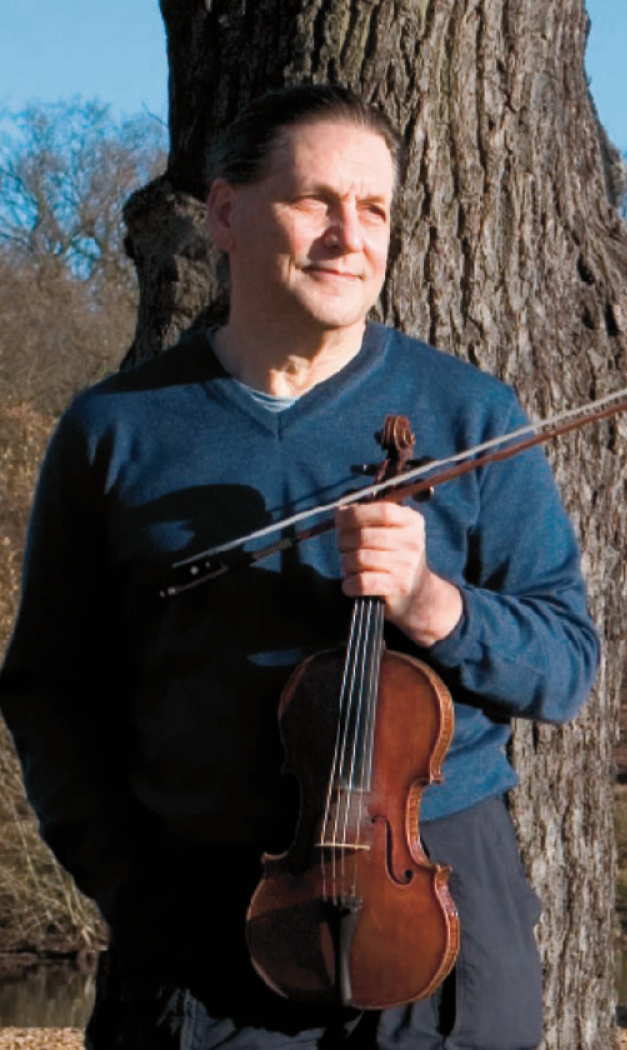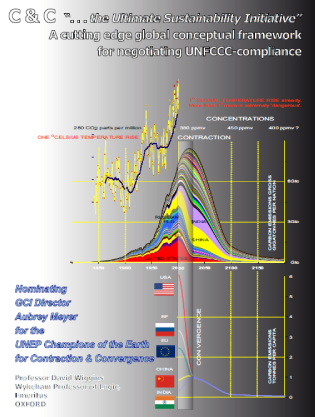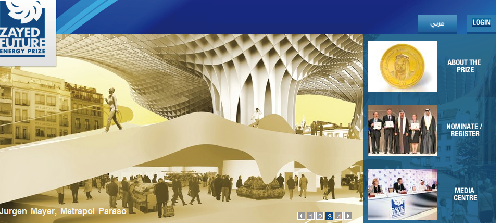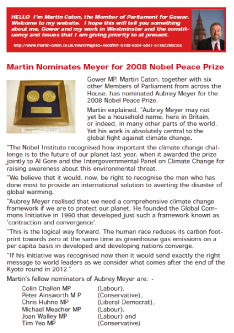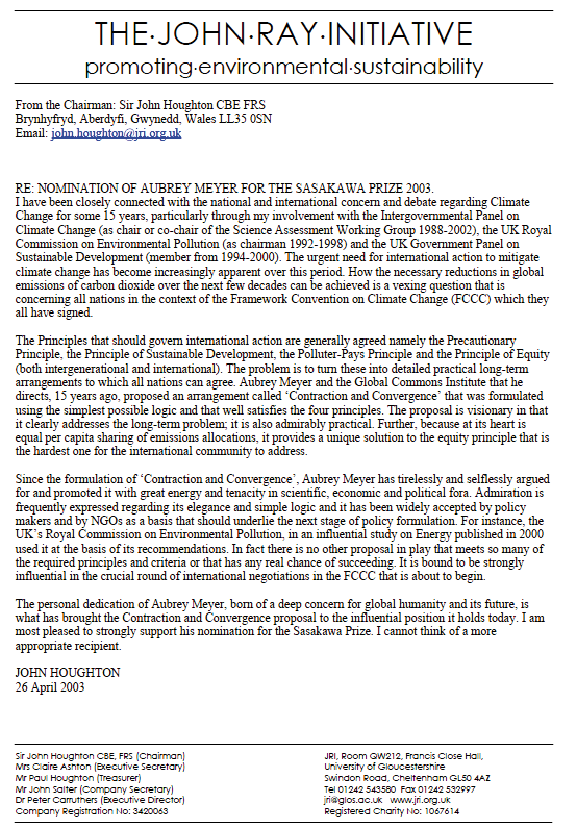Awards
 Click logo to return to 'links-page'
Click logo to return to 'links-page'
Nomination for Blue Planet Award by Ulrich Loening
It seems to me that Contraction and Convergence is the basic principle that should guide climate policy, and that this policy is really unchallenged in principle by any of the climate models under discussion.
Granted that it is good to have accurate models of how the world works, and to work out the numerical balances of C&C. Nevertheless, I wonder at what point complex and uncertain empirical models become a distraction from simple first principles? C&C is a necessary condition for a just and sustainable world.
With best wishes & admiration for your important work on C&C.
Herman Daly Emeritus Professor University of Maryland
The 14th Blue Planet Award winner to publicly endorse C&C.
Andrew Lees Memorial Award 1998
"Aubrey Meyer, almost single-handedly and with minimal resources, has made an extraordinary impact on the negotiations on the Climate Change Treaty, one of the most important of our time, through his campaign for a goal of equal per capita emissions, which is now official negotiating position of many governments, and is gaining acceptance in developed and developing countries alike."
The Schumacher Award 2000
"Aubrey Meyer set up his Global Commons Institute (GCI) in 1990, with minimal resources, to campaign to bring the threat of global warming to the attention of the public and to policy makers. For over ten years, with great determination and meticulous attention to scientific detail, he has presented his case counteracting the arguments put forward by corporate interests. Of special significance is his formulation of 'contraction and convergence' a strategy for fairly sharing the rights to emit carbon dioxide worldwide. This is increasingly recognised as the most logical and effective way of preventing climatic catastrophe while promoting justice and equity. It has made an extraordinary impact on the Climate Change Treaty negotiations."A Findhorn Fellowship 2004
"Aubrey Meyer is a professional violinist who has largely bracketed his music career to address the global challenge of climate change. Having attended the first UN meetings on the subject in the early 90's, he has since fully engaged with the issue and developed the 'Contraction and Convergence' model as an antidote to it. He created and directs the Global Commons Institute in London as a vehicle to advance his formula to virtually all who will listen. He presented it here at the Restore the Earth conference in 2002. Its genius lies in its capacity prospectively to reduce greenhouse emissions by the 60-80% that the UN IPCC (International Panel on Climate Change) say is required to minimise the likely devastating effects of global warming. His views are increasingly endorsed by prominent members of the British establishment. I hope you join me in welcoming Aubrey to the Fellowship and in supporting his remarkable, indeed heroic, initiative. Aubrey Meyer is arguably the world's foremost carbon strategist and to global warming what Michael Moore is to the US electoral saga - a delightful maverick who just might save the day."
City of London Life-Time's Achievement Award 2005
"From the worlds of business, academia, politics and activism, Aubrey Meyer has made the greatest contribution to the understanding and combating of climate change having led strategic debate or policy formation. In recognition of an outstanding personal contribution to combating climate change at an international level through his efforts to enhance the understanding and adoption of the principle of Contraction and Convergence."
Euro Solar Award
WINNER Aubrey Meyer for Contraction and Convergence Communication
Aubrey Meyer is a musician and composer. In 1988 he was looking for a subject for a musical and came across the story of Chico Mendez and his assassination in the Brazilian Rainforest. Aubrey co-founded the Global Commons Institute (GCI) in 1990 through which he developed the principle of 'Contraction and Convergence' (C&C) which has become a central feature of the debate about our common future under the conditions of global climate change. C&C is now the subject of a Private Member's Bill before the UK Parliament. The GCI website contains very clear information.JUDGES COMMENTS: The concept of Contraction and Convergence introduces a sane dimension to the politics of energy, and forms a backdrop against which renewable energy projects can be developed.
Hon. Fellow of Royal Institute of British Architects 2007
"For his challenging and inspirational promotion of environmental issues, in particular his development of the concept of Contraction and Convergence.”Architects adopted C&C at RIBA Council in 2006 and asked Aubrey to present C&C at their annual conference in October. There, RIBA’s Chairman declared climate change as the dominant agenda for the 21st Century, called for C&C targets and committed RIBA to campaigning for C&C.
He was an inspirational speaker at the RIBA’s 2006 Annual Conference in Venice and reported theevent as follows;
“Meyer, formerly a professional musician, started with a virtuoso performance that was simultaneously moving, terrifying and informative. He played the violin theme to Schindler’s List to images of the environmental holocaust he went on to argue that we face.”
UNEP FI Global Roundtable Financial Leadership Award 2007
"UNEP FI for the first time recognized executives within the financial services who have contributed in a significant manner to the development of financial ideas, innovative products, institutional change and or the carbon markets themselves through the UNEP FI Carbon Leadership Award.Four executive awards were given for each category of financial services: Banking, Insurance/Reinsurance, Asset Management/Private Banking and Pension Funds. In addition, an award was given for a representative from civil society who had worked towards the same end. Award winners were selected from a large number of entries by a small group of UNEP FI’s long term climate change advisors.
The civil society category award for the most impressive commitment and innovative thinking around climate change and the financial sector with the UNEP FI Carbon Leadership Award went to Aubrey Meyer of the Global Commons Institute."
Aubrey Meyer - Guardian Hero 2008
"Can a 60-year-old South African violinist living in a flat in Willesden north London, actually change the world?” It’s a serious question because the odds are increasing that over the next two years rich and poor countries will come round to Aubrey Meyer's way of thinking if they are to negotiate a half-decent global deal to reduce climate change emissions. The long years of single-minded lobbying mean that Meyer’s idea now has some powerful backers, including in Britain, the Royal Commission on Environmental Pollution. 180 MPs have supported it in an early day motion, and the government, equivocal so far, is moving towards a version of it. It has become official policy in India, China and most African countries, Germany and India are expected to run with it in UN meetings. Angela Merkel, the German chancellor, has backed C&C publicly. Other proposals are emerging and it will take two more years to thrash out a system that will please everyone. But few have the elegance of C&C. It's the least unfair of all the proposals that have been put forward, Meyer says. It secures survival by correcting both fatal poverty and fatal climate change in the same arrangement. Meyer still plays the violin every day, but seldom with an orchestra.”I just did not realise that it would take quite so long to change the world," he says.Independent on Sunday Top Environmentalists 2008: 6/100 Aubrey Meyer, Campaigner

"This former busker came up with what is widely recognised as the fairest solution to global warming, based on everyone being entitled to emit the same amount of carbon. Pushed it relentlessly until many governments took it up. Now endorsed by Angela Merkel and Nicolas Sarkozy.Climate Consent - Timeline for events, recognition and awards 1990 - 2011
Contraction and Convergence . . . the Ultimate Sustainability Initiative
A cutting edge global conceptual framework for negotiating UNFCCC-compliance
Nomination - but not winner of - GCI Director Aubrey Meyer
for the UNEP Champions of the Earth for Contraction & Convergence
Professor David Wiggins - Wykeham Professor of Logic, Emeritus OXFORD530
Nomination - but not winner - of Aubrey Meyer and 'Contraction & Convergence' for Zayed Prize
by Dr. Mayer Hillman, Senior Fellow Emeritus, Policy Studies Institute, London and 24 others"Aubrey's effort to keep the C&C approach visible at the centre-ground of UN climate politics has substantially paid off. It resulted in the adoption and advocacy of C&C by the UK Royal Commission on Environmental Pollution [RCEP] in 2000. After that he published a body of evidence on C&C for the UK Parliamentary Select Committees who in turn have repeatedly published reports strongly advocating C&C to successive UK Governments. In the light of all these recommendations, this has resulted in the UK Climate Act [2008] being clearly based on C&C. Awarding this Prize to Aubrey Meyer for Contraction & Convergence, could be invaluable in achieving consensus on the global deal needed for success at the UNFCCC. It would not just be a recognition of his effort, it would send a strong signal to the UN saying that to survive, we must finally transcend the politics of blame and join together globally in this constitution for Climate Justice without Vengeance."
Nomination again by Mayer Hillman for Zayed Prize
Nomination - but not winner - of Aubrey Meyer for the 2008 Nobel Peace Prize
by Martin Caton, and six other Members of Parliament from the UK House of Commons
Martin’s fellow nominators were Colin Challen MP (Labour), Peter Ainsworth MP (Conservative), Chris Huhne MP (Liberal Democrat), Michael Meacher MP (Labour), Joan Walley MP (Labour) and Tim Yeo MP (Conservative).Martin explained, “Aubrey Meyer may not yet be a household name, here in Britain, or indeed, in many other parts of the world. Yet his work is absolutely central to the global fight against climate change.” The Nobel Institute recognised how important the climate change challenge is to the future of our planet last year, when it awarded the prize jointly to Al Gore and the Intergovernmental Panel on Climate Change for raising awareness about this environmental threat. “We believe that it would, now, be right to recognise the man who has done most to provide an international solution to averting the disaster of global warming.” Aubrey Meyer realised that we need a comprehensive climate change framework if we are to protect our planet. He founded the Global Commons Initiative in 1990 that developed just such a framework known as “contraction and convergence”.
This is the logical way forward. The human race reduces its carbon footprint towards zero at the same time as greenhouse gas emissions on a per capita basis in developed and developing nations converge. If his initiative was recognised now then it would send exactly the right message to world leaders as we consider what comes after the end of the Kyoto round in 2012.
The personal dedication of Aubrey Meyer, born of a deep concern for global humanity and its future, is what has brought the Contraction and Convergence proposal to the influential position it holds today. I am most pleased to strongly support his nomination for the Sasakawa Prize. I cannot think of a more appropriate recipient.
John Hougton
Chairman John Ray InitiativeAubrey Meyer is testimony to the fact that individual effort can make a difference. It is absolutely remarkable that the idea of Contraction and Convergence has taken such a firm hold worldwide in such a short space of time, especially when you see the tiny operation which has championed this essential idea. I remember at Kyoto in 1997 when policymakers derided the proposition without a second thought. That type of response has all but disappeared, certainly within the more thoughtful arenas of climate policy. Through sheer determination, focus and good manners Aubrey has broken through global ignorance and prejudice to make just, common sense prevail and he has done so on climate change, the most chronic threat which the world currently faces. We all have a great deal to thank Aubrey for, and I firmly believe that there is no-one better to receive the Sasakawa Award. Please give Aubrey Meyer your greatest consideration.
Tessa Tennant
Director ASRIAI support the nomination of Aubrey Meyer. Over the past fifteen years he has developed the idea of Contraction and Convergence as an international solution to the challenge of global warming and climate change. He has done this through the Global Commons Institute with very little funding and infrastructure. These ideas influenced the Royal Commission on Environmental Pollution in the development of its report "Energy: the Changing Climate" and Contraction and Convergence was the basis of the recommended 60% reduction in carbon emissions. This recommendation has been taken up by the government in its recent Energy White Paper and is now the generally accepted basis for policy by a range of government, industry and NGOS. He is a visionary and the award of the Sasakawa Prize would give much support to this very important work, and be a splendid recognition ofhis important contributions.
Sir Tom Blundell,
Chairman, Royal Commission on Environmental Pollution.If ever there was an initiative that deserved recognition and support, it is the brilliant and relentless campaign waged by this fiercely independent, creative and apparently quite tireless individual.
Michael Meacher
UK Minister of the EnvironmentI want to support the nomination of Aubrey Meyer for the Sassakawa prize. If this award is about people and institutions that make a real difference then he should be recognised by it. In 50 years time we will talk of Meyer's principle much as we talk about the Kyoto agreements now.
Richard Sandbrook
A UNEP global 500 award winner, co-founder of Friends of the Earth and Director of IIED 1988- 1999
